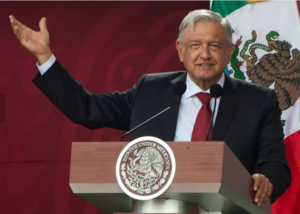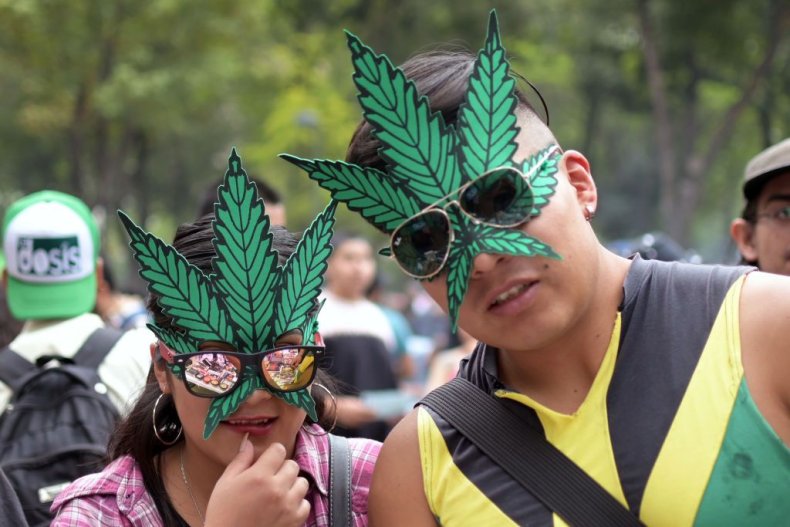
Mexican President Andres Manuel Lopez Obrador delivers a speech at the Santa Lucia Air Force Base in Zumpango, near Mexico City, on April 29.
Mexico Wants to Decriminalize All Drugs and Negotiate With the U.S. to Do the Same
Jason Lemon, Newsweek,
(https://www.newsweek.
com/mexico-decriminalize-
drugs-negotiate-us-1421395)
Mexico’s president released a new plan last week that called for radical reform to the nation’s drug laws and negotiating with the United States to take similar steps.
The plan put forward by the administration of President Andrés Manuel López Obrador, often referred to by his initials as AMLO, calls for decriminalizing illegal drugs and transferring funding for combating the illicit substances to pay for treatment programs instead. It points to the failure of the decades-long international war on drugs, and calls for negotiating with the international community, and specifically the U.S., to ensure the new strategy’s success.
“The ‘war on drugs’ has escalated the public health problem posed by currently banned substances to a public safety crisis,” the policy proposal, which came as part of AMLO’s National Development Plan for 2019-2024, read. Mexico’s current “prohibitionist strategy is unsustainable,” it argued.
Mexico’s president released a new plan last week that called for radical reform to the nation’s drug laws and negotiating with the United States to take similar steps.
The plan put forward by the administration of President Andrés Manuel López Obrador, often referred to by his initials as AMLO, calls for decriminalizing illegal drugs and transferring funding for combating the illicit substances to pay for treatment programs instead. It points to the failure of the decades-long international war on drugs, and calls for negotiating with the international community, and specifically the U.S., to ensure the new strategy’s success.
“The ‘war on drugs’ has escalated the public health problem posed by currently banned substances to a public safety crisis,” the policy proposal, which came as part of AMLO’s National Development Plan for 2019-2024, read. Mexico’s current “prohibitionist strategy is unsustainable,” it argued.
The document says that ending prohibition is “the only real possibility” to address the problem. “This should be pursued in a negotiated manner, both in the bilateral relationship with the United States and in the multilateral sphere, within the [United Nations] U.N.,” it explained.
Drug reform advocates have welcomed AMLO’s plan. Steve Hawkins, executive director of the Marijuana Policy Project, told Newsweek that the Mexican president’s plan “reflects a shift in thinking on drug policy that is taking place around the world, including here in the U.S.”

A couple attends a rally in support of the legalization of marijuana at the Alameda Central Park in Mexico City, on May 4. One in five prisoners globally are incarcerated due to drug-related crimes, often for simply possessing cannabis or other illicit substances.
“The war on drugs has been extremely costly, not just in terms of government resources, but also human lives, and it has failed to accomplish its objective,” he explained. “Prohibition policies have, by and large, caused more harm to people and communities than the drugs they were intended to eliminate, and they haven’t come anywhere close to eliminating the supply or the demand.”
Last October, the International Drug Policy Consortium (IDPC), a global coalition of 170 nongovernmental organizations working on drug policy issues, released a report that highlighted the “spectacular” failure and global increase in violence that has been caused by the war on drugs. Instead of curbing the problem, “consumption and illegal trafficking of drugs have reached record levels,” Helen Clark, former prime minister of New Zealand and a member of the Global Commission on Drug Policy, wrote in the document’s foreword.
The IDPC report found that there had been a 145 percent increase in drug-related deaths over the previous 10 years. The number of deaths reached an estimated 450,000 in 2015 alone. Drug overdose deaths have also skyrocketed, with 71,000 overdose deaths in the U.S. alone in 2017. Additionally, one in five prisoners globally are incarcerated due to drug-related crimes, often for simply possessing cannabis or other illicit substances.
“Mexico’s president is rightly identifying one of the major drivers of violence and corruption in his country: the prohibition of drugs,” Maria McFarland Sánchez-Moreno, the executive director of the Drug Policy Alliance, a nonprofit that advocates for ending the war on drugs, said in an emailed statement to Newsweek. “The next step is to translate words into action, by pursuing both a domestic and international agenda of drug policy reform, grounded in respect for human rights.”
(Read more: https://www.newsweek.com/mexico-decriminalize-drugs-negotiate-us-1421395.)

